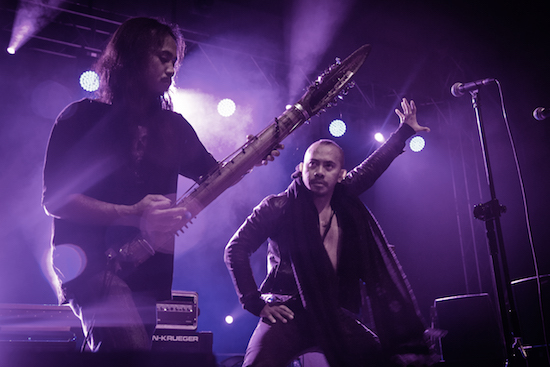We All Have Much To Lose
Beneath Krakow’s main square is a subterranean museum about the city’s history. Here, visitors can see the ruined walls, buildings, market stalls, drains and graves above which tourists, and horse and traps carrying tourists, wander and clatter. At the end of the guided route through the ancient stones is a series of small films looking at the history of Krakow and its importance to Poland as a whole. The well-translated narration by a genteel old chap in a linen suit explored how Poland as a nation is such a fragile entity, constantly subsumed and reviving again after invasion by the Tatars, Swedes, Hapsburgs, Nazis and Russians. In Britain, ignoring the centuries of migration that made us who we are, we tend to see ourselves as overly united, fixed as place in time, which is in part what leads to our xenophobic, conservative, narrow state of being.
The Unsound 2016 theme of Dislocation then feels apposite, especially given the current state of Polish politics and Britain’s recent decision to vote to leave the EU, both of which dominate my thoughts throughout the week in Poland, along with much of the festival booking. In the two years since I was last here the political situation has changed entirely, with obvious repercussions for the future of artistic collaborations and independent festivals like this across the continent. With that in mind, I did find I missed the kind of sets that were the real highlights of 2014 – moon music Polish folk group Księżyc, The Bug and Cyclobe – but then as a matter of taste I am always going to be made more juicy by bombast and group performance than the solo electronic musician.
Instead, a sense of fracture and dissonance permeate many of the performances during the week, from Babyfather’s frustrated anger to the brittle not-quite-techno of Sote, or the uncomfortably intense pounding to which Anna Zaradny subjected the Hotel Forum on Thursday night. Gaika managed to pull off the rare feat of making a banquet rather than an awkward mess from sex, soul and politics while on the Wednesday evening Horse Lords, who mix minimalism with an intensely focussed take on math rock were so uptight in their high strapped instrumentation (the guitarist had removed all extraneous knobs on his instrument and patched the holes with tape and chewed a cocktail stick throughout) that they practically refused to let anyone not dance.
Speaking to various people from festivals in other European countries, along with artists and punters, it’s abundantly clear just how seismic a decision the Brexit vote is, and what an impact it’ll have on UK involvement in festivals like Unsound. Our national funding boards are not exactly brilliant at supporting this sort of event anyway (the British Council seems to view music as a hard-nosed business export rather than an opportunity to promote artistic dialogue) and one imagines that it’ll only get harder once Brexit happens. It doesn’t feel paranoid to think that this week of pan-global communication in Krakow be one of the last parties before a darker, isolated future? Just look at the glories that pan-global club music is offering at the moment. While some of the ‘post-genre’ club music on the bill felt a little slight, reliant on 90s hits, Rihanna bootlegs and gunshots, those who did smash everything together never failed: in Kamixlo’s Chile-via-London monster of a set on Saturday night wherein ‘Paleta’ proved itself to be one of the greatest bangers of recent years, while the Principe duo of Marfox & Nervoso’s kuduro caused one of the nails in the sole of my right hand brogue to invade my foot. But it was all tinged by a feeling of what next? I don’t think you’d have seen artists from this many nationalities coming together to share stages that might leap from footwork to Indonesian throat singing to acid techno to dancehall in the space of a few hours ten years ago.
If anything there’s a sense that Unsound offers a narrative of how things might be in a better, more enlightened times – the strongest performances of the week long blur of incredible music came from cross-cultural collaboration, especially Rabih Beaini’s stunning set with Senyawa on the Thursday night. I hope that this level of collaboration and festivals like Unsound might continue to exist ten years hence, but to be honest I’m not overly confident. Alongside the endless wander through the autumn streets of Krakow there was a certain gallows humour in conversations with the various people, a sort of ‘How Grim Is Your Country In This Bleak Year Of 2016’ Top Trumps. It seems we’ve all drawn a bum hand. It’ll be intriguing to see how the fast-evolving global situation shapes the second leg of the Unsound: Dislocation theme next year – perhaps it’ll be against a lighter background. We can but hope. In the interim here are some things learned at and highlights of Unsound Krakow 2016. Luke Turner
It was hard to escape going further down the spiral
Russian-born artists Dasha Rush and Stanislav Glazov launched this year’s Unsound with vast AV concert featuring two gigantic rings of light, one behind the other, inspired by black holes. Where tQ sat didn’t exactly allow for the best view – the rings were a little off kilter and a light from above made the whole thing less immersive than the presumed intention, but over Rush’s rattles and rumbles the whole effect was like being sucked into a cosmic washing machine. The vortex returned a couple of days later in a fascinating, fast-paced presentation by Kristen Gallerneaux about the strange sonic spectres that haunt space around us, from the mysterious ‘hum’ reported in so many locations around the world to unusual structures with possibly occult or UFO provenance to old synthesisers, the picking up of noise from black holes. And lo! It set us up nicely for the rest of a week that continued in the same vein, a blur of sound, image, and innumerable visits to Krakow’s fantastic purveyors of meats cur’d, chopp’d, sausag’d. – Luke Turner
Collaboration makes for happy dislocation
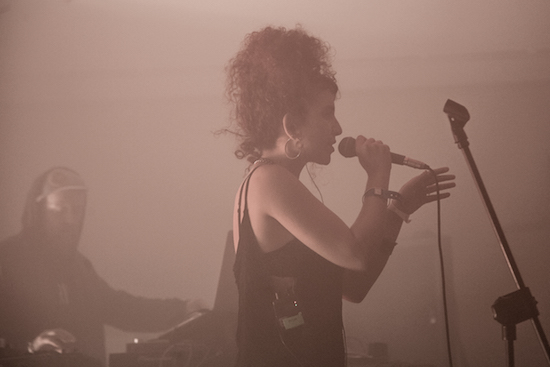
Much of the heady spin comes courtesy of Unsound’s aforementioned ability to conjure up collaborations that, by and large, feel like unselfconscious dialogues and true sharing ideas. There was one misfire when on the opening night Moritz von Oswald’s watery techno booms sat awkwardly underneath the traditional music of Ordo Sakhna, a group of young musicians from Kyrgyzstan. The deep vocals and lute of (Giorgos) Xylorius and (Jim) White brought Australian Greco romance to the Manggha before Stara Rzeka, AKA Kuba Ziolek, one of our favourite artists who we are still seemingly destined to never play his own set live, did a far wonderful if at times a little too submissive job of weaving his distinctive burbling guitar and field recordings into the instrumentation of Tajik ensemble Samo. At the other end of the spectrum the debut performance of Ancient Methods and Cindytalk’s collaborative project In The Mouth Of The Wolf on the opening night at the Hotel Forum was further evidence that the current vogue for hard-edged industrial-influenced techno doesn’t have to end up into a narrow, reductive cul-de-sac. While many on the moribund fringes of that scene like to flirt with the aesthetics of the far right this is a pummelling yet un macho tribute to the anti-Nazi White Rose Movement’s Sophie Scholl, Gordon Sharp prowling the stage, singing and twirling her hands as Ancient Methods’ Michael Wollenhaupt hangs onto his laptop for dear life as the bass threatens to send it flying. Similarly mastering the subs is a surprise appearance by Kevin ‘The Bug’ Martin, manning the desk and the decks in support of Miss Red in Hotel Forum’s small but bracingly potent second room. For all the ruckus that Martin inevitably brings to the show Miss Red is still 100% the star – it’s a testament to her presence and flow as MC that she’s able to ride all over the avalanche Bug riddims that thunder about the place, as ever her vocal range sharp glass amidst the dense racket. Plus how good is it to hear a female-voiced ‘Skeng’? On the final night London’s Helm and Moscow’s Moa Pillar provide an expansive soundtrack to footage shot on a long journey through Siberia. It works because inside the vast landscapes the film picks out tiny details – a glimpse of a girl playing with a wheel hub, a man boxing a football post – in a way that’s quietly celebratory of ordinary lives being got on with, all around the world. It’s followed by Body Sculpture’s concert with the Sinfonietta Cracovia, Loke Rahbek towering over the front rows bellowing oblique sentences into two mics as the music – stentorian noise from BS meshed admirably well with the sinfonietta’s orchestration – growls away behind him, sound much like early Laibach. The finest of all though was Rabih Beaini’s collaboration with Senyawa, that came off like an entirely contemporary summoning and incarnation of the spirit of Damo Suzuki-fronted Can. – Luke Turner
Pantheist devotional rave is my new jam
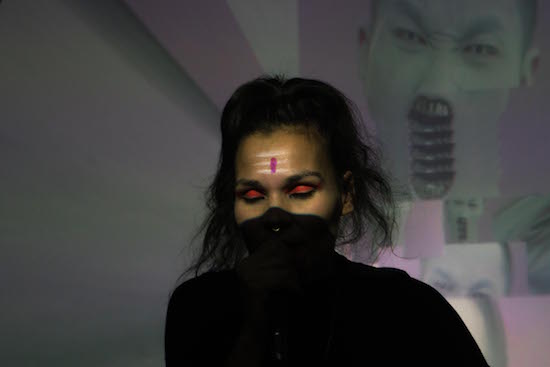
Aisha Devi’s pantheist rave gets more and more potent every time I encounter it, first at Berghain, then at a church in Brighton and tonight in an art gallery that quakes. This is transcendental music and a Tower of Babel, synths like burnished copper as Devi’s vocals hove between warm and austere as they saw between and beyond language. Behind her gyrating shadow a collage of imagery takes in alchemy, pagan and Christian imagery, symbols and sigils of snaking cocks a shirtless man painted white shaking a plucked chicken in his teeth. It has an utterly haunting effect on the crowd – we’re sat at the back and gradually the standing forms in front of us begin to sway as the music rises in intensity, a forest in a gathering storm. – Luke Turner
I saw Matmos and Robert Ashley wave goodbye to an old America
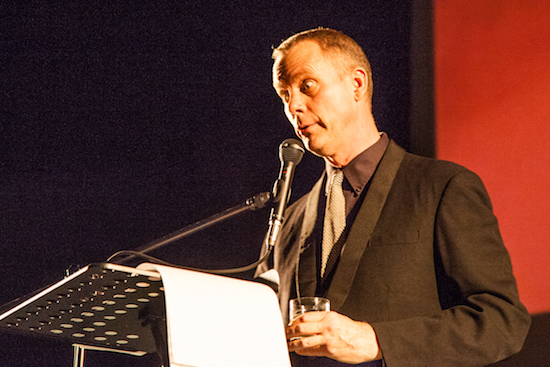
In the Q&A a couple of days before Matmos played their version of Robert Ashley’s 1983 telly opera Perfect Lives either Drew Daniel or MC Schmidt described him as "a great American writer disguised as a composer". This rather stuck with me during the flawless performance of three acts of Perfect Lives on the Thursday night. Trying to respond to such an idiosyncratic piece of work (best viewed rather than explained) is no mean feat but Matmos and their associate musicians pull it off with aplomb, wit, style, their interpretation based on respect for the original rather than reverence. Schmidt’s take on the narrative comes with a costume change between acts and is expressive, thoughtful and rather endearing over Drew Daniel’s sturdy electronic backing. What’s so striking about their Perfect Lives is an unexpectedly elegiac atmosphere, especially in the final act The Backyard, with its description of tiny figures in an everywhere America evening some time non-specific in the past has its down-home reality tempered with the oddness of David Lynch or Raymond Carver. Against the background of the current US election this nuanced exploration of small-town American existence has an added poignancy. – Luke Turner
More sex please I’m British
If there’s a slight flaw with festivals of head-challenging electronic music it’s that they sometimes rather neglect the other areas of the body that we liked to have stimulated with sound. That’s no issue with Yves Tumor, who announces his performance in the bar-cum-clubroom of the Hotel Forum by playing an initial blast of racket from one of the recent records by The Body before clambering onto the CDJs wearing nothing but an apron, jockstrap, boots and a studded collar. Standing on the CDJs and whacking them with barely concealed balls can obviously have a detrimental impact on the quality of one’s backing track, but after a couple of bangers Tumor flies into the crowd over a barrage of noise that sounds like a Coil sample falling into a machine for punching holes in leather, grabbing and humping audience members. I’ve rarely heard an artist sound so utterly different from their record, and while the experience of er ‘handling’ Yves Tumor overhead in a crowdsurf (apologies for leaving a scratch from a broken nail on your right cheek, Yves) has prompted a reappraisal of Pan debut Serpent Music, I for one am hoping for this wonderful frottage to be captured on future records. – Luke Turner
Waclaw Zimpel has lovely clackers
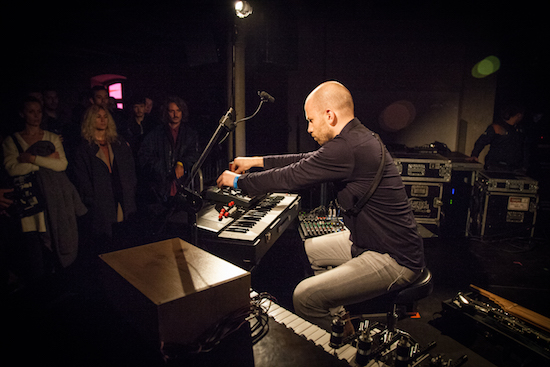
One of the great joys of Unsound is that you’re as likely to come across one of the best sets at the festival in the middle of the afternoon as one of the evening shows. Indeed, there’s no sense of hierarchy in terms of when sets are programmed which is immensely refreshing, even if it makes our job rather tricky – most of of the days are spent missing talks and music as we keep the good ship Quietus afloat via hotel room wifi. Nevertheless one of the best moments of the festival, and indeed of my musical year, was Waclaw Zimpel in the old tobacco factory shortly before tea on Wednesday. Set up in the middle of the dusty floor, he used a keyboard played by clattering mechanical fingers as the bed over which to loop to build tinkling and propulsive automaton smooth jams that burble like the water that leaks from the fucked guttering in the rain outside. For his final track he plays a Laos wind instrument called a khene, eight bamboo tubes that he blows fast and faster, the ancient analogue parps of a tree-based instrument sampled and looped and becoming electronic, musical parps rolling into rhythm; as hectic as anything one might encounter at Club Forum later on. – Luke Turner
I Like Smoke & Lightning, Heavy Metal Aesthetic Thunder
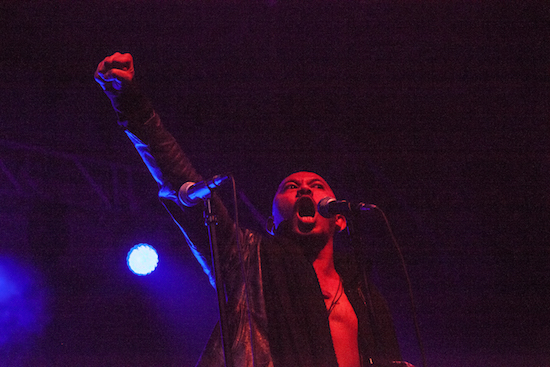
Metal’s ultra-modernist project of the 2000s seems to have finally stalled somewhat. The juicy cold cuts of weird experimental music available to anyone approaching the heavy metal schlachteplatte with an empty stomach and a taste for new experience just five to ten years ago, were extremely mouth-watering. This experimentation, understandably, has slowed somewhat in recent years though, even if the scene’s maverick energy hasn’t become entirely trapped in the quick drying cement of reterritorialization just yet. But as the modernising impulses at the left-facing fringes of the genre weaken, those wishing to cash in on the imagery and aesthetics of metal without having to deal with its uncomfortable sonic realities carry on with their smash and grab unchecked. And this is to the extent that one can even have a little bit of sympathy for the permanently angry trv kvlt below the line comment whoppers decrying long-haired, battle jacket wearing, fixed gear bike riding hipsters everywhere. A tiny little bit, at least. At the moment it seems that for every band of metallers still trying to push the envelope (hello Oranssi Pazuzu, hello Jute Gyte) there are fifty other guitar groups contemplating taking it down a gear or two and having a conversation that goes roughly like this: “Hey you guys, we’ve got really obscure Swedish black metal T-shirts, we’ve got an Electro Harmonix Big Muff, we’ve got Rat pedals coming out of the wazoo, Kev’s doctor says he has to rest his throat because of the nodules, my CBT counsellor says I need to adopt a more positive outlook on life, so why don’t we make… a Slowdive LP.”
Whether MESH are consciously borrowing black metal aesthetics to cloak their abstract techno in or not (tremble before the kvlt altar of ‘The Black Pill’ from the album Piteous Gate wretched mortal!) is not for me to say. They may have completely different intentions, namely making sonic tribute to the ‘he’s behind you!’ section of a local panto starring Little Jimmy Krankie or simply be engaged in trying to recreate the terrifying darkest-just-before-the-dawn sensation unleashed by a particularly harrowing episode of Scooby Doo moments before the chain-dragging spectre is unmasked as a disgruntled school janitor. Whatever the intent, it is fair for me to say that – unlike the utterly superb Waclaw Zimpel and the dynamic We Will Fail in the same venue – James Whipple gets tied in knots trying to construct something that is both elementally overwhelming and tastefully constructed. He fails to harness any of the massive potential of playing a set in a partially abandoned/partially reclaimed, dank, dark and dusty industrial warehouse in an autumnal and twilit Krakow. The set is not bad by any stretch but it is resolutely flat and perfunctory. It is music for people to nudge each other to. We leave Mr Whipple head down over a flickering Apple sign, unpacking heavily signposted and referential electronic signifier after heavily signposted and referential electronic signifier. As we exit the building the skies darken as a murder of thousands of crows glides overhead. It seems clear that the uncanny sublimity of nature does not need placing within quotation marks.
There are some obvious and deep links between Death Grips’ thrilling but macho nihili-rap and the church ov extreme metal but these links run a clear second to the influence of drum and bass, noise, modern free jazz and digital hardcore. Anyone getting to the venue in time to see the Grips’ support act Senyawa, are treated to the most heavy metal act of the entire weekend however. I’ve been waiting to see this sui generis duo for nearly three years now and they still manage to completely surpass my expectations. Even if you didn’t already know that vocalist Rully Shabara Herman and instrumentalist Wukir Suryadi grew up dyed in the wool metalheads, you’d only have to watch them for one song to realise it. Mic stands and instruments are brandished against the audience like weapons… this is entertainment as warfare. Despite this being ostensibly traditional Indonesian music, it is audibly played by people who grew up loving Slayer, Sepultura, Metallica, Pantera and Obituary. Suryadi’s unique and self-built, bamboo-spear harp (its shape references the Dutch colonial bayonet) is so versatile that it enables him to produce the three foundational elements of the classic heavy metal sound – a brutally primitive and crunching rhythm, tar-thick riffs and quicksilver solos. A literal translation of Senyawa is ‘chemical compound’ – suggesting that the pair are distinct units that can lock together to produce something entirely new. This name is earned tonight as for every sound that is wrenched out of the bamboo harp, Herman easily matches it in variety via vocal contortions from the shrillest of black metal shrieks to the most guttural death metal growls via a full range of throat singing traditions and demonic whispers.
Heavy metal may be going through something of a fallow patch at the moment in terms of experimentation but given that it’s an aesthetic as old as the volcanoes and raging seas that Herman sings about, it will, no doubt, be back and revivified before too long. Senyawa show that even on a bill where literal heavy metal is conspicuous by its absence, the genre’s deep and sincere obsession with the uncanny and the sublime will not be suppressed. The duo are absolutely superb and are, by the shortest of margins (there is great competition from Miss Red, Yves Tumor, Waclaw Zimpel, Sote and Matmos), my favourite act at this incredible festival. – John Doran

